It was something of an accident, that Kim Wirth ’96 even saw the sign at all. A communication executive with The International Paper Company.
By Derek Herscovici ’14
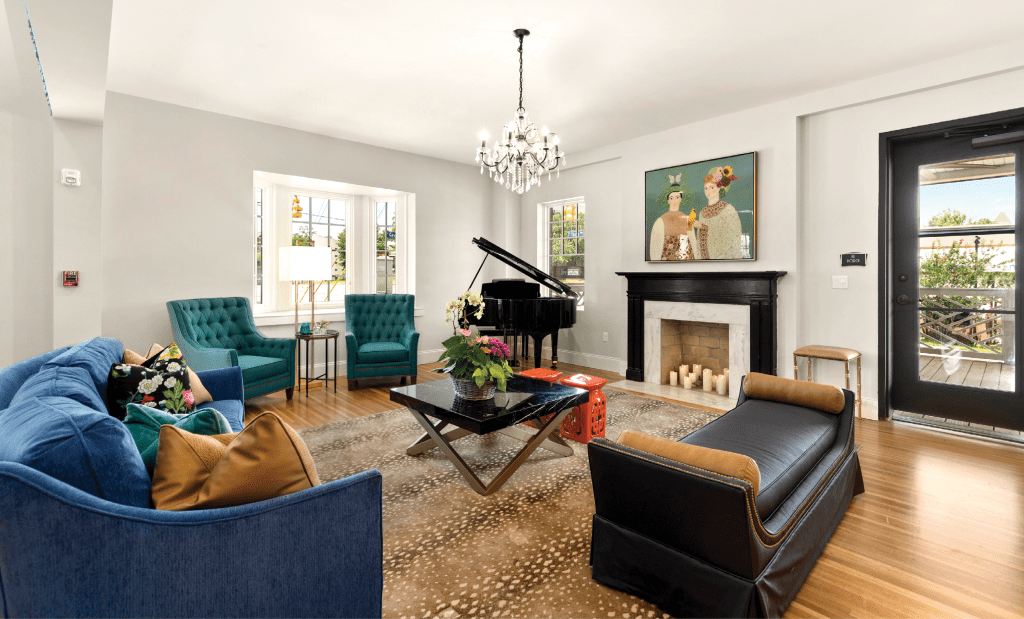
The old Wittel Dormitory, an Auburn landmark, was on the market for the first time in more than half a century. Wirth instantly reached out to the realtor, even before calling her husband. When she did call Brian Wirth ’95, she told him it was urgent.
Now, a little more than three years later, what was once a dusty relic of a bygone era has transformed into a new Auburn institution, boasting 40 fully furnished rooms, a golf cart taxi service for guests of the hotel and a rooftop bar with nearly 360-degree views of Samford Hall and downtown. For the Wirths, it was an opportunity to not only honor the past, but breathe new life into the venerable location.
“We’ve always been drawn to older homes, like kind of reimagining them,” said Kim. “I told my husband, ‘If we don’t take this opportunity, this leap of faith, I’m going to kick myself every time I drive by that corner and it’s something else.’ If it got torn down, I think my heart would have broken a little bit.”
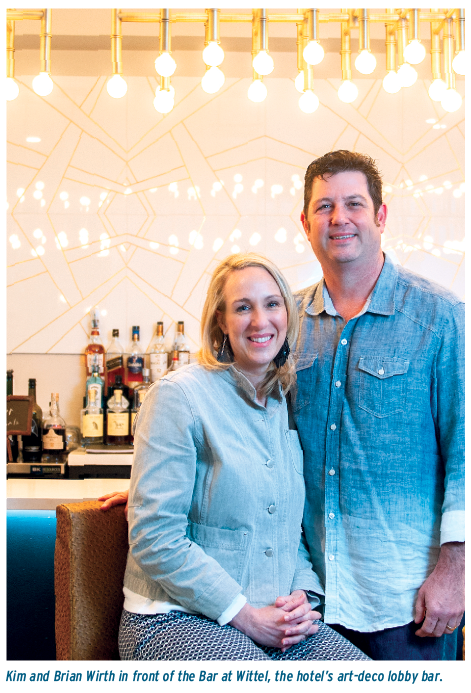
Wittel Hall opened in 1946 as Auburn’s first dorm for women at a time when most female students were not allowed to live off-campus. Dave Wittel ’39, the original owner, operated the dorm and lived in part of it with his family. In a standard practice of the time, men were not allowed past the lobby without someone yelling “man on the hall,” a rule that carried through to 2016 when Kim and Brian came to tour the space.
As the former vice president of development and cost forecasting for DreamCatcher Hotels, Brian quickly realized that the site’s location and size would be ideal for a new boutique hotel, the first of its kind on the Plains.
Throughout the renovation process, the Wirths remained in contact with the previous owners, Pat Wittell Tremaine ’66 and husband Leslie Tremaine ’68, to preserve the original hardwood floors, fireplaces, the exterior brick awnings and much of the furniture that dates to the early 20th century.
“It fit what we’d always done with repurposing older homes,” said Brian. “We’ve always enjoyed the challenge of working together and making it something new again. [The building] had kind of outlived its day as a dorm, and we just felt the way it was set up would be a great opportunity for a hotel.”
The Wirths joke that The Collegiate is “the hotel that Auburn built” for how many alumni were involved in its design. Besides themselves, Amanda Whitaker ’01 and Rebecca Conrad ’89 served as the architects for the project, H. Montgomery Martin ’78 of Montgomery Martin LLC served as the general contractor and several Auburn engineers all contributed to the final design.
Drawn in by the history, unique floor plan and location only two blocks from Toomer’s Corner, they both agreed the building was well-suited for new life as a hotel, but they both had strong opinions about how the finished product would look. At the heart of their collaborations is a good-natured, competitive spirit that began the moment they met at Auburn.
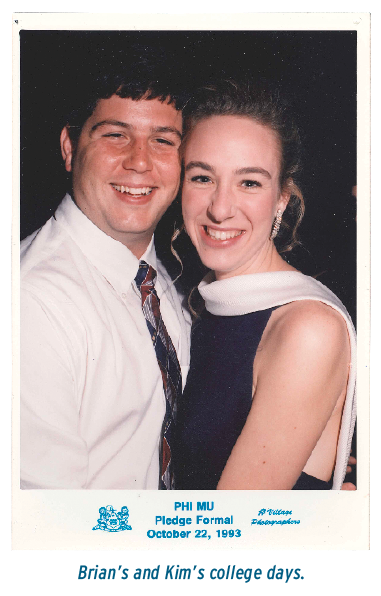
Living off-campus his sophomore year, Brian’s roommate would invite friends over to use their washer and dryer, on the condition that they cooked dinner. One day, his roommate’s friend brought Kim over.
“We got to talking about basketball,” Brian recalls. “Kim had been on a state championship basketball team, [and] I was the fraternity, beer-drinking guy. So, we challenged each other to a game of basketball and she almost beat me. We went out on our first date after that.”
After graduation and marriage, they started renovating historic homes around the country. Some of their first renovations were in Washington D.C.’s Staten Park and Union Station neighborhoods, along the Gulf Coast and a few in Auburn dating back to the 1940s, all while caring for their three children. “We were Chip and Joanna [Gaines] before they were cool,” said Kim, referring to the stars of HGTV’s “Fixer Upper.”
Despite their conflicting ideas, they both work well together.
“I have big ideas, and then he was really good at trying to figure out how to cost-effectively implement it without saying, ‘No you can’t have that,’” said Kim. “I’m wildly creative and he’s a very practical engineering man, so we kind of meet in the middle. It makes for a lot of fun projects, for sure.”
One of their earliest decisions had to do with the room layouts; Kim wanted each to have its own personality, while Brian, concerned with economies of scale, wanted to keep details consistent. In the end they compromised on 13 different configurations for their 40 rooms, each with its own one-of-a-kind, locally sourced artwork.
Other times, it was the “happy surprises” that determined the hotel’s direction, like when they discovered that the attic had unparalleled views of Samford Hall and the surrounding area.
“You don’t even know that you have this amazing view because nobody had a rooftop area around here,” said Kim. “I think that was the first time we said we’re going to have a rooftop bar.”
As they continued renovating, other discoveries included original hardwood floors, beautiful exposed-brick walls and historic furniture. The dorms on the “garden level” were transformed into pet-friendly rooms, each with their own patios.
But the Wirths were also conscious about straying too far from the building’s history and decided not to build to their maximum height to retain the old dorm’s distinct shape.
“I think that was the first time we said we’re going to have a rooftop bar.”
As operators as well as owners, keeping the Collegiate at 40 rooms allows them to manage the hotel without bringing in an outside company. Though concierge work is a new experience for both, the Wirths enjoy being on the frontlines of guests’ Auburn experience. From putting toilet paper out to roll Toomer’s Corner after sports wins to operating a complimentary golf cart shuttle around town, they go above and beyond to deliver the perfect experience on the Plains.
They have also hired student interns interested in hotel management and hospitality services to work the front desk.
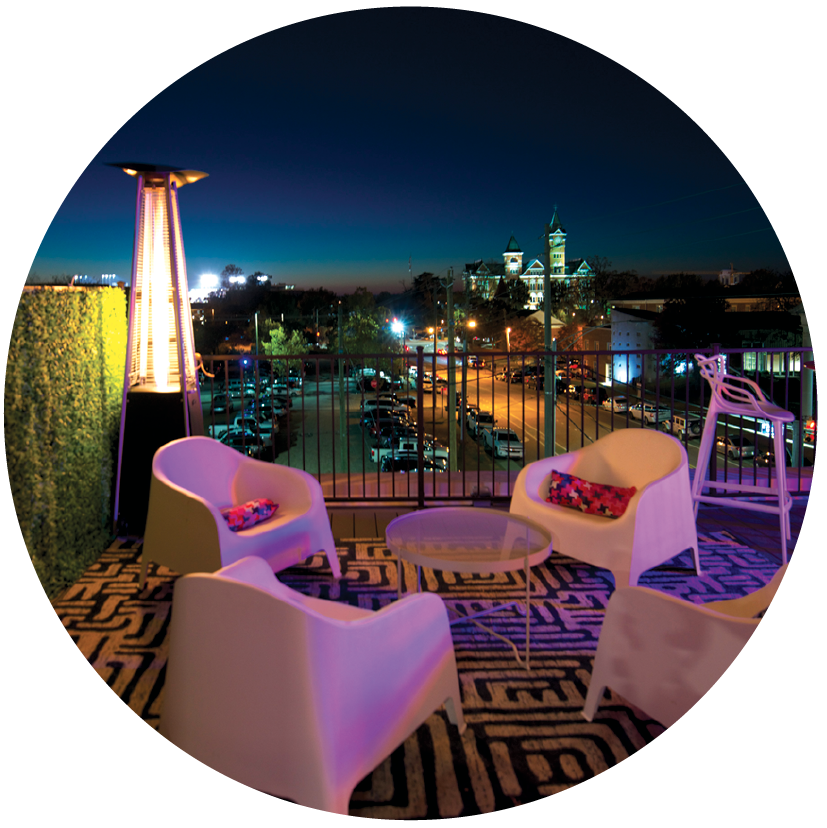
Students are not just working at the hotel. The venue’s rooftop bar has become a popular place for dates, sorority formal pictures and unexpected gatherings. Many of their guests were onetime residents of Wittel Dorm. Nearly all of them call to ask if the floors still have shared bathrooms and often request rooms where their old dorms used to be.
At the front desk in the lobby, a library of Glomeratas greets guests as they check in, one of The Collegiate Hotel’s newest traditions.
“If you’re an alumni and you’re in [the Glomerata], you find your picture and sign your name,” said Brian. “We’ve had groups of people come in and go through the rows of the Gloms, and they find their family members or uncles or their friends that have already signed in and know they’ve been here, so it’s pretty neat.”
Whether its repurposing history or creating new traditions, The Collegiate Hotel marks the growing evolution of Auburn.
“It used to be, the only reason you would come to Auburn was if you’re going to school, you’re going to a game or your kids went here,” said Brian. “Now, Auburn’s become a destination itself.”
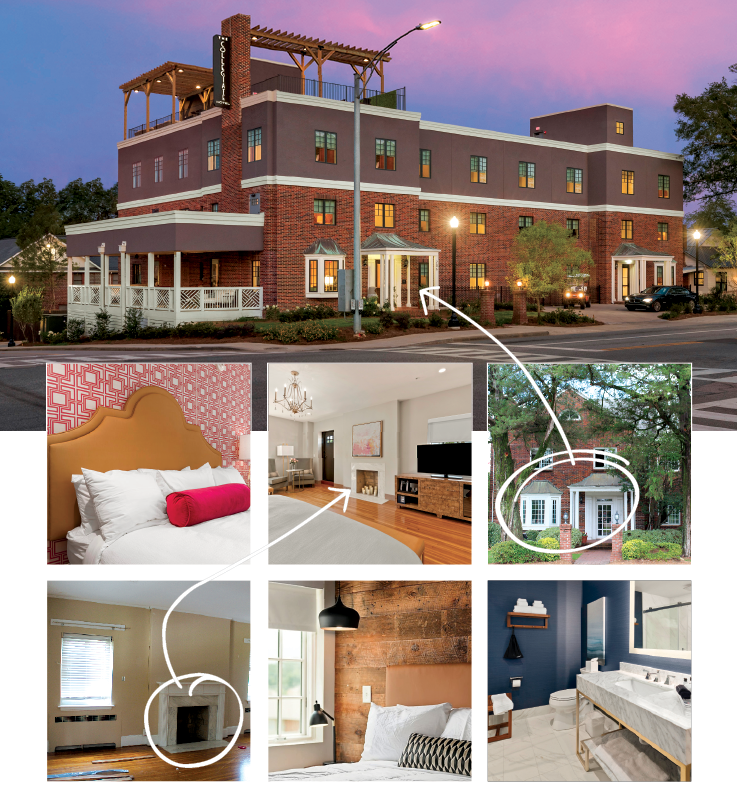
The Tales of Sydney and the Furry Friendship That Started It All
A special dog and unique friendship between two Auburn alumna lead to a series of successful children’s books.
Lost and Found
Retired veterinarian Nancy East ’97 found her purpose by finding others.
Still Skiing After All These Years
The Auburn University Water Ski Club celebrated 50 years with a party of the ages.
The Tales of Sydney and the Furry Friendship That Started It All
A special dog and unique friendship between two Auburn alumna lead to a series of successful children’s books.
Lost and Found
Retired veterinarian Nancy East ’97 found her purpose by finding others.
Still Skiing After All These Years
The Auburn University Water Ski Club celebrated 50 years with a party of the ages.


